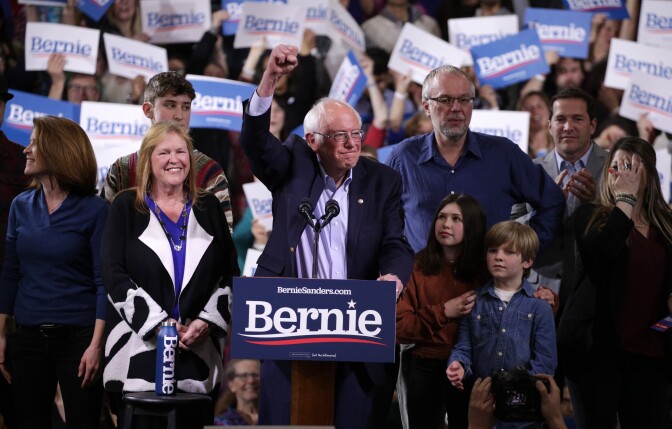Today on AirTalk, we discuss Sanders' California win and Biden's national comeback. Also on the show, we check in on voters' experiences at the polls in Los Angeles County; explore how Bloomberg could continue to influence the election; and more.
Sanders Takes California And The Primaries Start To Look Like A Two-Man Race
Senator Bernie Sanders came out of California a winner, but former VP Joe Biden proved a strong showing as he took major Super Tuesday victories.
California was only one of 14 states that voted Tuesday, but its more than 400 delegates made it the most coveted primary in the narrowing Democratic field. But it is not clear how many delegates Sanders will claim from California. The final tally won’t be sorted out for days as state officials still must count late arriving mail-in ballots.
The former vice president showed strength in the Northeast with a victory in Massachusetts. He won delegate-rich Texas in the Southwest, Minnesota in the upper Midwest and finished on top across the South in Virginia, Alabama, North Carolina, Tennessee and Arkansas — in addition to Oklahoma.
Sanders opened the night as the undisputed Democratic front-runner and was in a position to claim an insurmountable delegate lead. And while he scored the night’s biggest delegate-prize in California, he scored just three other decisive victories, winning his home state of Vermont, along with Utah and Colorado.
The balance of Super Tuesday’s battlefield — with Biden winning at least eight states and Sanders four — raised questions about whether the Democratic primary contest would stretch all the way to the July convention or be decided much sooner. The ultimate nominee must claim 1,991 delegates, which is a majority of the 3,979 pledged delegates available this primary season.
Today on AirTalk, our political panel breaks down what happened on Super Tuesday and what the results mean for the race moving forward.
With files from the Associated Press
Guests:
Pete Peterson, dean of the School of Public Policy and senior fellow at The Davenport Institute at Pepperdine University; he tweets
Sonja Diaz, the founding executive director of the Latino Policy and Politics Initiative at UCLA, a non partisan think tank; she’s also a practicing civil rights attorney and policy adviser
Tom Campbell, professor of economics and law at Chapman University; he is a former California state senator (R-Campbell, 1993-1995), U.S. congressman (1989-1993 & 1995-2001), and director of the California Department of Finance under Governor Schwarzenegger (2004-2005)
Libby Denkmann, senior politics reporter for KPCC; she tweets
Poll Workers, What Was Your Experience With LA’s New Voting System?
Many Los Angeles voters reported issues at the County’s new vote centers on Super Tuesday, with long lines, jammed machines and check-in problems being cited as common problems.
Yesterday was LA’s first election with the new Vote Centers, centralized voting locations that replaced neighborhood polling precincts, thanks to the 2016 Voter’s Choice Act.
Some voters said they enjoyed the new touch-pad ballot machines, as well as the convenience of being able to vote at any Vote Center in the County. But with wait times as long as two and a half hours at some locations, there was also plenty of grumbling and berating of the new system.
One choke point seemed to be with e-poll books, the iPads used to sign in and register voters, especially at USC and UCLA, where lots of students were going through the registration process.
If you were a poll worker yesterday, we want to hear from you. What were some of the issues that you saw yesterday? If you’ve volunteered during previous elections, what differences did you observe? Were there advantages to the new system? Call us at 866-893-5722.
Guest:
Fernando Guerra, professor of political science and Chicano/Latino studies and director of the Center for the Study of Los Angeles at Loyola Marymount University; member of the KPCC Board of Trustees
Mike Bloomberg Has Dropped. What Can He Do With His Never Ending Resources?
Former New York City Mayor Mike Bloomberg announced Wednesday he’ll end his bid for president. According to the New York Times, Bloomberg has spent more than half a billion dollars on advertising alone since joining the race a few months ago.
His decision to exit the race follows a disappointing Super Tuesday finish for the candidate. Bloomberg is now setting his sights on helping former VP Joe Biden, who he has endorsed as the candidate who can take on and beat President Donald Trump. Bloomberg’s ad campaign is likely to help whoever the Democratic nominee is because most of the ads simply attack Trump. Now that the former mayor is no longer a candidate in the race, the rate for advertising goes up.
Today on AirTalk, Larry talks with a campaign finance law expert about how Bloomberg can channel his seemingly never ending resources to continue supporting his cause: remove Trump from office.
Guest:
Bradley Smith, expert in election law and campaign finance; professor of law at Capital University in Columbus, Ohio; he’s currently the chairman of the Institute for Free Speech, a nonprofit organization in Washington, D.C. that promotes and defends First Amendment free speech rights; he served on the Federal Election Commission (2000-2005) and was chairman of the Commission in 2004; he tweets
Mayor Eric Garcetti On LA’s Response To New Coronavirus Cases
A U.S. health official says six new cases of the coronavirus have been confirmed in Los Angeles County, where there was one previously.
Each case confirmed Tuesday night was due to a known exposure and not the result of community transmission, according to Dr. Barbara Ferrer, director of the county Department of Public Health. She spoke at a press conference on Wednesday. She says one person has been hospitalized and five others were in self-quarantine at home.
Mayor Eric Garcetti joins Larry to talk about the city’s response to the new coronavirus -- and its impact on the local economy.
With files from the Associated Press
Guest:
Erik Garcetti, Mayor of Los Angeles




